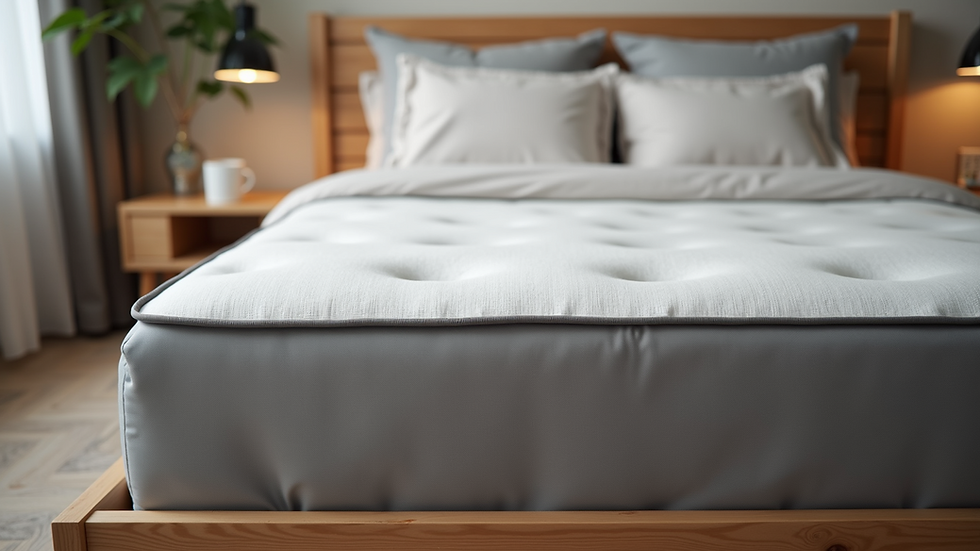Choosing the best mattress for your sleep position and body type
- Admin

- Sep 18, 2025
- 4 min read
Finding the perfect mattress can feel like searching for a needle in a haystack. With so many choices available, it’s easy to feel overwhelmed. But don’t worry! This guide will help you navigate the world of mattresses by focusing on your sleep position and body type. After all, a good night’s sleep is essential for your overall well-being and daily productivity.
Let’s dive into how to choose the ideal mattress that suits your unique needs!
Understanding Sleep Positions
Before you begin shopping for a mattress, it’s crucial to understand your sleep position. Your preferred sleeping posture significantly influences the type of mattress that will provide you the best support and comfort.
Side Sleepers
If you’re a side sleeper, you likely need a mattress that offers excellent pressure relief for your shoulders and hips. Studies show that a softer mattress, especially those made from memory foam or a hybrid design, can reduce pressure by up to 30% compared to firmer options. These mattresses help cradle your body while maintaining spinal alignment.
Back Sleepers
Back sleepers typically benefit from a medium-firm mattress that provides support for the lower back while allowing for some contouring. Latex or hybrid mattresses are great as they offer a balance of comfort and support. In fact, research shows that 70% of back sleepers prefer medium-firm or firm mattresses for optimal spinal alignment.
Stomach Sleepers
If you sleep on your stomach, a firmer mattress is essential to prevent your hips from sinking too deeply. A firmer surface keeps your spine in a neutral position and can reduce the risk of back pain. Consider innerspring or firmer latex mattresses for optimal support, as studies show these types of mattresses lead to a 20% lower chance of developing back pain.
Considering Body Types
Your body type also plays a significant role in determining the best mattress for you. Here’s how to choose based on your body type:
Lightweight Individuals
If you weigh less than 59 kilograms, you may prefer a softer mattress that allows for more contouring. Memory foam or plush hybrid mattresses can provide the support you need without feeling too firm. Many lightweight sleepers report 80% satisfaction with softer mattresses due to their adaptability.
Average Weight Individuals
For those weighing between 59 and 104 kilograms, a medium-firm mattress is often the best choice. This mattress type provides a balance of support and comfort, accommodating various sleep positions effectively. Surveys indicate that nearly 65% of average-weight sleepers prefer a medium-firm feel.
Heavier Individuals
If you weigh over 104 kilograms, a mattress that offers extra support and durability is crucial. Look for firmer options with high-density foam or robust innerspring systems. These mattresses can prevent sagging and provide the necessary support for restful nights. Research shows that 90% of heavier individuals feel better supported on firmer mattresses compared to softer alternatives.
Mattress Materials
Now that you understand how sleep position and body type affect your mattress choice, let’s explore the different materials available.
Memory Foam
Memory foam mattresses are renowned for their contouring abilities. They provide pressure relief and support, making them ideal for side sleepers and lightweight individuals. However, they can retain heat. Look for gel-infused options if you tend to sleep hot; these can reduce heat retention by up to 25%.
Innerspring
Innerspring mattresses are conventional and readily accessible. They provide sufficient support and bounce, making them ideal for those who sleep on their back or stomach. However, they might not offer enough pressure relief for side sleepers. For back sleepers, a mattress with durable and supportive coils is a good choice.
Latex
Latex mattresses are durable and offer a responsive feel. They provide excellent support and pressure relief, making them a versatile option for various sleep positions and body types. Additionally, they tend to sleep cooler than memory foam, with studies indicating around 30% better temperature regulation.
Hybrid
Hybrid mattresses combine foam and innerspring coils, offering the best of both worlds. They provide excellent support, comfort, and breathability, making them suitable for all sleep positions and body types. Many users report feeling less pressure on their joints with hybrids, making them a popular choice in today's market.
Testing Your Mattress
Once you’ve narrowed down your options, it’s time to test your mattress. Here are some tips to ensure you make the right choice:
Spend Time Lying Down: Don’t just sit on the edge of the mattress. Lie down in your preferred sleep position for at least 10-15 minutes to gauge comfort and support.
Check for Motion Transfer: If you share your bed, test how well the mattress absorbs movement. A good mattress should minimize motion transfer, allowing you to sleep undisturbed. Studies show that mattresses with memory foam can reduce movement transfer by over 80%, ensuring restful slumber.
Consider customisation: Many mattress companies offer customised mattresses. Take advantage of this to ensure it meets your needs.
Final Thoughts
Choosing the best mattress for your sleep position and body type doesn’t have to be a daunting task. By understanding your unique needs and preferences, you can find a mattress that provides the support and comfort you deserve.
Remember to factor in your sleep position, body type, and the materials that will work best for you. Test potential choices before making a final decision and take advantage of trial periods when available.
With the right mattress, you will be well on your way to enjoying restful nights and energized mornings!

Happy mattress hunting!



Comments